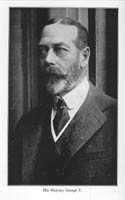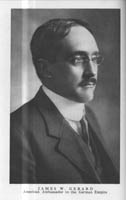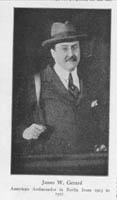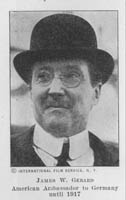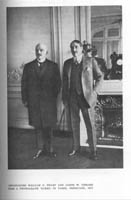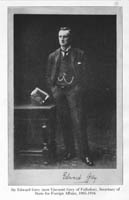Table of Contents
Key Figures
Statesmen
a | b | c | d-e | f | g | h-i | j-l | m | n-o | p | r | s | t-v | w-y
King George V of Great Britain (1865-1936)
George was the second son of King Edward VIII and became the heir apparent upon the death of his brother, Albert Victor, in 1892. He served in the Royal Navy and gained an in-depth knowledge of the British Empire through his travels. He married Princess Victoria Mary of Teck the next year. George became the Prince of Wales in 1901, when his grandmother, Queen Victoria, died and his father ascended the throne. In 1910, George V became the King of England and Emperor of India and would rule for twenty-six years. After Britain declared war on Germany in response to the German invasion of neutral Belgium, George cut off all connections between the royal family and all things German; he changed the name of his house from Saxe-Coburg-Gotha to Windsor to underline this transition. George opened Buckingham Palace to British servicemen on leave during the war and became an important national symbol. In spite of the problems with Ireland and the creation of the Irish Free State in 1921, George dedicated his reign to establishing close ties between Britain and the member states of the Commonwealth.
James Watson Gerard (1867-1951)
An American lawyer and statesman, Gerard became an Associate Justice of the New York State Supreme Court in 1908 and served until 1911. President Woodrow Wilson appointed Gerard U.S. Ambassador to Germany in 1913. Representing one of the few neutral Great Powers, Gerard recognized early in the war that the responsibilities of representing belligerent interests far exceeded the resources of his staff. These responsibilities included the inspection of prisoner of war camps and the proper treatment of Allied POW's. Gerard welcomed the American YMCA's request to establish War Prisoners' Aid services in German prison camps. When the Germans announced the resumption of unrestricted submarine warfare at the end of January 1917, Wilson severed diplomatic relations with Germany and recalled Gerard. He unsuccessfully attempted to gain the Democratic presidential nomination in 1920.
Joseph Clark Grew (1880-1965)
Grew spent most of his lifetime in service with the U.S. Department of State. He began this service as the secretary of the American embassy in Vienna (1911-1912) and became the embassy secretary in Berlin from 1912 to 1916. He played an important role in the inspection of German prison camps on behalf of the Allied governments during World War I. After the war, Grew served as U.S. Minister to Denmark (1920), U.S. Minister to Switzerland (1921), and negotiated the peace treaty with Turkey in 1923. He served as Undersecretary of State in the Coolidge administration (1924-1927), U.S. Ambassador to Turkey (1927-1932), U.S. Ambassador to Japan (1932-1941), and Undersecretary of State in the Roosevelt administration (1944-1945).
Sir Edward Grey (1862-1933)
Third Baronet and Viscount Grey of Fallodon, Grey served as a Member of Parliament from 1884 to 1916. He became the Undersecretary of State for Foreign Affairs from 1892 to 1895 and Secretary of State for Foreign Affairs from 1905 to 1916. Grey promoted the British rapprochement with France to counterbalance growing German power and he supported the British declaration of war against Germany in August 1914 for German violation of Belgian neutrality. He was the chief architect of the secret treaty which brought Italy into the war on the side of the Allies in May 1915. He resigned from office as Foreign Secretary due to ill health in 1916 and became a viscount for his service to King and country. After the war, Grey became the British Ambassador to the United States.
